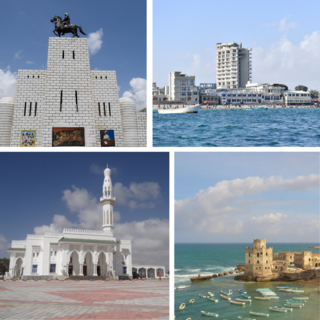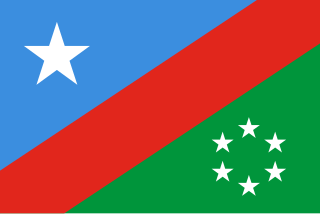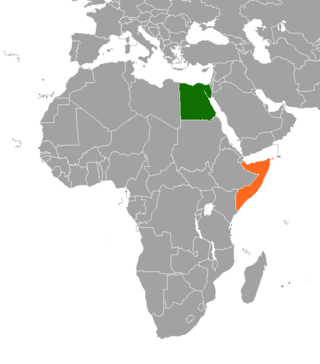Related Research Articles

Somalia, officially the Federal Republic of Somalia, is a country in the Horn of Africa. The country is bordered by Ethiopia to the west, Djibouti to the northwest, the Gulf of Aden to the north, the Indian Ocean to the east, and Kenya to the southwest. Somalia has the longest coastline on Africa's mainland. Its terrain consists mainly of plateaus, plains, and highlands. Hot conditions prevail year-round, with periodic monsoon winds and irregular rainfall. Somalia has an estimated population of around 17.1 million, of which over 2 million live in the capital and largest city Mogadishu, and has been described as Africa's most culturally homogeneous country. Around 85% of its residents are ethnic Somalis, who have historically inhabited the country's north. Ethnic minorities are largely concentrated in the south. The official languages of Somalia are Somali and Arabic. Most people in the country are Muslims, the majority of them Sunni.

Communications in Somalia encompasses the communications services and capacity of Somalia. Telecommunications, internet, radio, print, television and postal services in the nation are largely concentrated in the private sector. Several of the telecom firms have begun expanding their activities abroad. The federal government operates two official radio and television networks, which exist alongside a number of private and foreign stations. Print media in the country is also progressively giving way to news radio stations and online portals, as internet connectivity and access increases. In 2012, a National Communications Act was also approved by Cabinet members, and 2 October 2017, the president of Somalia Finally signed the National Communications Law, and became the official Law that regulated the ICT industry. Under that Law, National Communications Authority (NCA) of the federal Republic of Somalia has been established, with board of directors and a general manager. Somalia currently is ranked first in Africa for most affordable mobile data per gigabyte and 7th in the world.

Transport in Somalia refers to the transportation networks and modes of transport in effect in Somalia. They include highways, airports and seaports, in addition to various forms of public and private vehicular, maritime and aerial transportation.

Mogadishu (, also ; Somali: مُقدِشُ[mʉq'dɪ:ʃɔ] or Xamar[ħɑmɑr]; Arabic: مقديشو, locally known as Xamar or Hamar, is the capital and most populous city of Somalia. The city has served as an important port connecting traders across the Indian Ocean for millennia, and has an estimated urban population of 4,249,083. Mogadishu is located in the coastal Banadir region on the Indian Ocean, which unlike other Somali regions, is considered a municipality rather than a maamul goboleed.

Puntland, officially the Puntland State of Somalia, is a Federal Member State in northeastern Somalia. The capital city is the city of Garoowe in the Nugal region, and its leaders declared the territory an autonomous state in 1998. Geographically to the west, Puntland lays claim to the intra-46th meridian territories that were outside European colonial rule during parts of the Scramble for Africa period.

The South-West State of Somalia, is a Federal Member State in southwestern Somalia. It was founded by Hasan Muhammad Nur Shatigadud, leader of the Somalia RRA on 1 April 2002. It was the third autonomous region to be established.
Somali National University (SNU) is a national university in Mogadishu, the capital of Somalia. Its campus grounds were located four kilometers from the Mogadishu International Airport. It was established in 1971, but was "officially" founded in 1954. It closed in 1990. After closing down for a number of years, the university reopened in August 2014.

NNPC Limited is a for profit oil company in Nigeria. Formerly a government-owned corporation, it was transformed from a corporation to a limited liability company in July 2022. NNPC Limited is the only entity licensed to operate in the country's petroleum industry. It partners with foreign oil companies to exploit Nigeria's fossil fuel resources.

The Transitional Federal Government (TFG) was internationally recognized as a provisional government of the Republic of Somalia from 14 October 2004 until 20 August 2012, when its tenure officially ended and the Federal Government of Somalia was inaugurated.

The judiciary of Somalia is defined by the Provisional Constitution of the Federal Republic of Somalia. It stipulates that the national court structure is to be organized into three tiers: the Constitutional Court, Federal Government level courts, and Federal Member State level courts. A future nine-member Judicial Service Commission is empowered to appoint any federal tier member of the judiciary. It also selects and presents potential Constitutional Court judges to the House of the People of the Federal Parliament for approval. If endorsed, the President then appoints the candidate as a judge of the Constitutional Court. The five-member Constitutional Court is likewise empowered to adjudicate issues pertaining to the constitution, in addition to various federal and sub-national matters.

Mass media in Somalia includes various radio, television, print and internet outlets. The federal government operates two official radio and TV networks, which exist alongside a number of private and foreign stations. Print media in the country is progressively giving way to news radio stations and online portals, as internet connectivity and access increases. In February 2013, the Ministry of Information, Posts and Telecommunication also launched a broad-based consultative process for the reformation of media legislation.
The Somali passport is a somalia passport issued to citizens of Somalia for international travel. Green Passports were formerly used, which have since been replaced with biometric passports to ensure authenticity. The passports are regulated by the federal government of Somalia.

Abdiweli Mohamed Ali Gaas, also more known as Abdiweli Gaas, is a Somali American economist and politician. He served as the Prime Minister of Somalia from June 2011 to October 2012, and briefly afterwards as an MP in the newly formed Federal Parliament. During his time as Premier, Ali is credited with having devised the formal "Roadmap for the End of Transition", a political process that provided clear benchmarks leading toward the establishment of permanent democratic institutions in the country. On 8 January 2014, he was elected the 5th President of Puntland.

Somalia–Turkey relations are bilateral relations between Somalia and Turkey. The two nations are longstanding partners, engaging in close development cooperations. Somalia has an embassy in Ankara, and Turkey maintains an embassy in Mogadishu.
The Somali Civil Aviation Authority (SCAA) (previously: Somali Civil Aviation and Meteorology Authority (SCAMA)) is the national civil aviation authority body of Somalia. Based at the Aden Adde International Airport in the capital Mogadishu, it is under the aegis of the federal Ministry of Air and Land Transport. In 2012, the ministry along with the Somali Civil Aviation Steering Committee set a three-year window for reconstruction of the national civil aviation capacity. After a long period of management by the Civil Aviation Caretaker Authority for Somalia (CACAS), SCAMA in conjunction with the International Civil Aviation Organization also finalized a process in 2014 to transfer control of Somalia airspace to the new Air Space Management Centre in the capital.

Corruption in Somalia pertains to purported levels of corruption within Somalia's public and private sectors according to official metrics, anti-graft measures aimed at addressing those issues, as well as political dispensations and structural changes in government affecting transparency. Owing to a reported lack of accountability in the receipt and expenditure of public funds by the Transitional Federal Government, a federal Anti-Corruption Commission was put into place in 2011 so as to deter and eliminate graft. On Transparency International's 2022 Corruption Perceptions Index, Somalia scored 12 on a scale from 0 to 100. When ranked by score, Somalia ranked last among the 180 countries in the Index, where the country ranked first is perceived to have the most honest public sector. For comparison, the country ranked first in 2022 scored 90 and the average score was 43.
The Federal Government of Somalia (FGS) is the internationally recognised government of Somalia, and the first attempt to create a central government in Somalia since the collapse of the Somali Democratic Republic. It replaced the Transitional Federal Government (TFG) of Somalia on 20 August 2012 with the adoption of the Constitution of Somalia.

Jubaland, the Juba Valley or Azania, is a Federal Member State in southern Somalia. Its eastern border lies 40–60 km (25–35 mi) east of the Jubba River, stretching from Gedo to the Indian Ocean, while its western side flanks the North Eastern Province in Kenya, which was carved out of Jubaland during the colonial period.

Agriculture in Somalia is a major employment activity and is the largest economic sector in the country. It contributes more than 65% to the national GDP from domestic distribution and exports to other parts of the continent, the Middle East and Europe.

Egypt–Somalia relations are bilateral relations between Egypt and Somalia. Both nations are Arab League members and engage in close development cooperation. Somalia also has an embassy in Cairo, and Egypt is slated to reopen its embassy in Mogadishu.
References
- 1 2 Doya, David Malingha (8 August 2013). "Soma Oil & Gas May Invest $20 Million to Survey War-Torn Somalia". Businessweek. Retrieved 28 May 2014.
- 1 2 3 "Ministry petroleum team set up". The Indian Ocean Newsletter. 19 February 2013. Retrieved 27 May 2014.
- ↑ "Somalia Petroleum Law" (PDF). Transitional Federal Government of Somalia. Retrieved 3 June 2014.